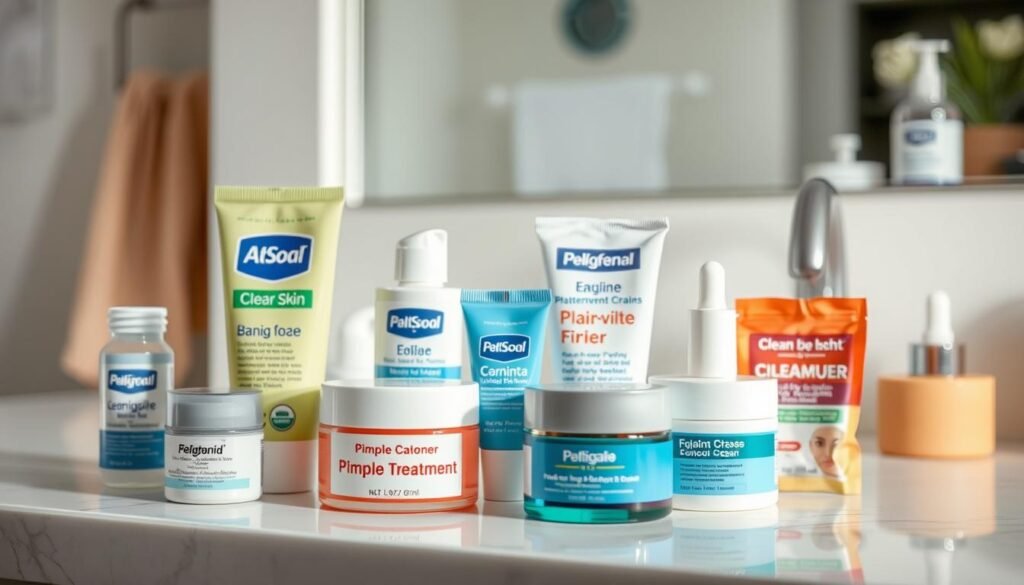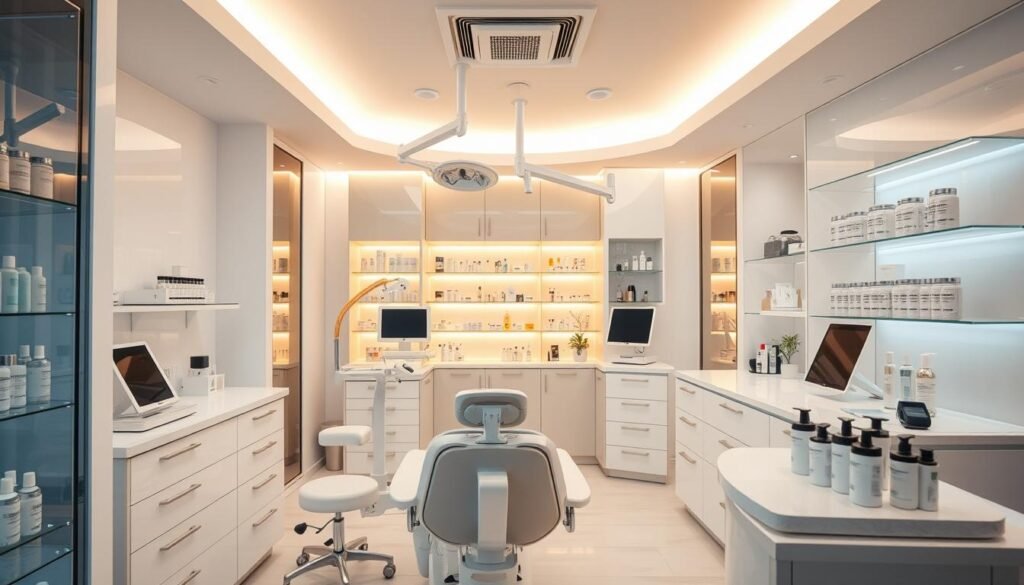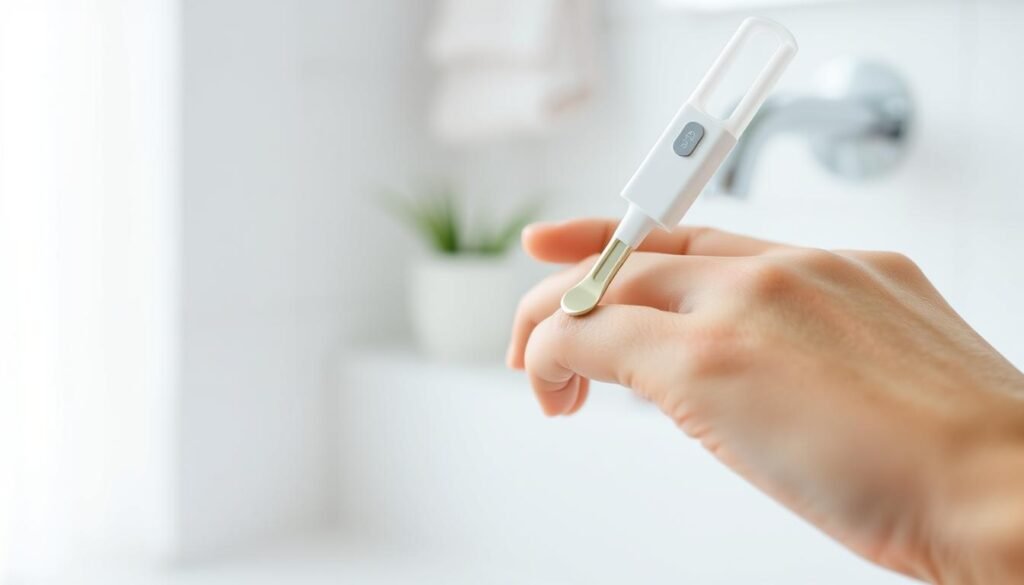Did you know nearly 85% of people in the United States have had acne at some time? Whitehead pimples appear as small white bumps. They are closed comedones caused by clogged pores. It’s crucial to know how to remove these pimples for clear skin. This article explores quick remedies, store-bought options, and ways to prevent pimples. You will learn how to tackle whiteheads safely and effectively.
Key Takeaways
- Whitehead pimples are small, non-inflammatory lesions caused by clogged pores.
- Effective treatment options include home remedies and commercial products.
- Apple cider vinegar and lemon juice offer natural solutions to combat whiteheads.
- Antiseptics like tea tree oil and witch hazel can help reduce acne-causing bacteria.
- Salicylic acid and benzoyl peroxide are popular over-the-counter treatments for acne.
Understanding Whiteheads: What Are They?
Whiteheads, or closed comedones, are a type of acne. They are small white bumps that appear when hair follicles get clogged. This clogging is due to sebum, dead skin cells, and bacteria. Unlike open blackheads, whiteheads are covered by skin. People of any age can get whiteheads, but they’re more common in teens.
Hormonal changes often lead to whiteheads. These changes can happen during puberty, menstruation, or pregnancy. Using certain contraceptives can also cause them. If acne is common in your family, you might get whiteheads too.
Friction from things like sports gear can make whiteheads worse. Even though they are a lighter acne type, anyone can get them. This includes adults who didn’t have acne as teenagers.
There are wrong beliefs about whiteheads. For instance, scrubbing your face hard won’t stop them. In fact, it can irritate your skin and make things worse. You shouldn’t try to pop whiteheads either. This can lead to irritation and scars. Knowing the truth helps in managing whiteheads better.
What Causes a Whitehead Pimple?
Whitehead pimples come from a mix of factors. Too much oil production is a big one, often due to hormones. This is especially true during puberty. If you have oily skin, you might see more acne.
Dead skin cells and bacteria also play a part. They block pores, leading to trouble. Knowing about these acne causes is key.
What we eat and do can affect our skin too. Foods high in sugar and dairy might make acne worse. Being stressed or not sleeping enough can also clog your skin. Certain skin and hair products don’t help either. They can make things worse, especially around your forehead, nose, and chin.
It helps to understand these causes when choosing skin care. If you’re having trouble, try products with salicylic acid. They can prevent clogged pores and help control acne. Doctors might suggest stronger treatments like retinoids for tough cases. Learning how excess oil, products, and habits affect your skin is crucial. For more tips, check this page about what causes whiteheads.
Best Home Remedies for Whitehead Pimples
Whiteheads are a common skin problem that many people face. People often look for home remedies to solve this. These treatments are affordable and use things you can easily find.
Facial Steam
Facial steaming is a straightforward way to clean your skin. The heat from the steam opens pores. This helps get rid of trapped dirt and bacteria. You can use a bowl of hot water or a NanoSteamer for deeper cleaning.
Apple Cider Vinegar
Apple cider vinegar is known for fighting bacteria and shrinking pores. It contains acetic acid which may lower skin bacteria. Always dilute it with water to avoid skin issues but still help with whiteheads.
Lemon Juice
Lemon juice acts as a strong natural cleaner, cutting down on oil and getting rid of whiteheads. Be careful when putting it on your skin. Sun can irritate the skin after using lemon juice. So, it’s best to use it at night and wash it off well before going outside.
| Home Remedy | Benefits | Usage Tips |
|---|---|---|
| Facial Steam | Unclogs pores and releases trapped dirt | Steam once a week for optimal results |
| Apple Cider Vinegar | Reduces bacteria and oils | Use diluted with water for safety |
| Lemon Juice | Natural astringent that combats oil | Apply at night, avoid sun exposure |
Top Over-the-Counter Treatments
Managing whitehead pimples begins with the right acne products. These target the root cause of pimples. Knowing what’s in these treatments makes your pimple fighting routine work better.
Salicylic Acid
Salicylic acid, a strong beta-hydroxy acid (BHA), helps exfoliate skin. It opens clogged pores, reduces oil, and aids in skin renewal. For example, CeraVe Salicylic Acid Cleanser contains this ingredient.
Its strength varies from 0.5% to 5%. Using salicylic acid consistently can improve your skin in weeks.
Benzoyl Peroxide
Benzoyl peroxide is known for killing acne-causing bacteria. It also cuts down oil production. You can find it in strengths of 2.5%, 5%, and 10%, like in Neutrogena Rapid Clear.
It’s a powerful option, but patience is key. You might wait four to eight weeks to see results. For more on treating acne, read this resource.

Natural Antiseptics and Astringents for Acne
Adding natural antiseptics and astringents to your skin care routine can make acne treatments work better. They not only fight bacteria but also soothe and protect your skin. Consider these popular options:
Tea Tree Oil
Tea tree oil is known for its strong anti-inflammatory and germ-fighting properties. It attacks acne-causing bacteria and helps heal the skin. Always mix tea tree oil with a carrier oil to prevent irritation. This natural remedy is favored for its effectiveness with few side effects.
Witch Hazel
Witch hazel has been used for ages to fight acne. It’s a natural astringent that also gently kills bacteria. It helps reduce swelling and tightens pores, which is great for oily skin. Witch hazel improves skin health and helps stop new acne from forming.
Honey
Honey fights bacteria naturally, making it a strong tool against acne. Use it as a spot treatment or in masks to calm inflammation and aid healing. Honey’s moisturizing effect is good for all skin types in battling acne.
When to Consult a Dermatologist
Knowing when to see a dermatologist for acne treatment is key. If you have stubborn whiteheads that won’t go away with home care, it’s time to seek help. Many teenagers, over 80%, struggle with acne that can last into adult years. When breakouts are frequent or severe and hurt or get inflamed, it’s a sign to get professional help.
Seeing a dermatologist means getting a treatment plan that suits you best. For really bad acne, like cysts, you might need prescription meds. Professional skin care helps tackle tough acne, lessening chances of scars or infections.
Things like hormone changes, stress, and genes can make acne worse. A dermatologist can check if adult acne, common from ages 20-50, needs special care like pills or isotretinoin. It’s important to know the type of acne you have, such as papules or cysts, for the right treatment.
To wrap up, if acne is making your life tough, seeing a dermatologist can greatly help. It leads to better skin and real solutions.

Additional Tips for Preventing Whitehead Pimples
Stopping acne starts with a regular skincare routine. Wash your face gently twice a day with a mild soap like Dove or Cerave. This removes oil and dirt without hurting your skin. Also, try not to touch your face too much to avoid spreading germs.
Choosing the right products is key in avoiding whiteheads. Use makeup that’s labeled non-comedogenic to keep pores clear. Make sure you take off all makeup before going to bed. Also, washing your hair often helps keep oils from causing whiteheads, especially if your hair is long.
Adding sunscreen to your daily routine is crucial, especially when trying home remedies. This protects your skin from damage. Keep personal items like phones, pillowcases, and sunglasses clean to prevent whiteheads.
If home treatments don’t work, see a dermatologist. Using these tips can help keep your skin clear and teach you more about handling acne.
How to Safely Remove a Whitehead Pimple
Removing a whitehead safely is key. It’s tempting but needs caution. This ensures the pimple is removed without harm.
Start by using a warm compress on the area. It opens the pores for easy extraction. Keep everything clean. Use sterilized tools or clean hands to avoid adding bacteria to the skin.

Apply gentle pressure if needed. Don’t push too hard to prevent skin damage. After getting the pimple out, cleanse the area. This fights bacteria.
Applying a retinol product afterwards is a good idea. It helps close the pore and heal the skin.
For tips on acne care, visit this resource on traditional treatments and natural remedies. Always prioritize safe methods to keep your skin healthy and clear.
Importance of Skincare Routine for Acne-Prone Skin
A dedicated skincare routine is key for those with acne-prone skin. It helps prevent and manage issues like whiteheads. Including products with salicylic acid or AHAs keeps pores clear and skin healthy.
For great skin health, balance hydration and moisture without blocking pores. CeraVe’s PM Facial Moisturizing Lotion is perfect for night. It has hyaluronic acid and niacinamide, helping skin stay resilient.
Several factors are key for a successful skincare routine:
- Using soap-free cleansers with a pH of 5.5 cleans well without irritation.
- Picking products like lightweight emulsions or gels helps avoid clogged pores, meeting acne-prone skin’s needs.
- Being careful not to over-wash as it can dry out and irritate the skin further.
Spending time to craft a careful skincare plan brings relief and lasting skin health benefits. A strong daily routine can transform skin, making breakouts less frequent.
Conclusion
Managing whitehead pimples well means understanding, treating, and avoiding them. It’s key to use homespun remedies and professional help based on your skin. A personal care plan, including regular cleansing and the right makeup, prevents new whiteheads. It also boosts skin health.
For ongoing whitehead troubles, try over-the-counter products or natural fixes. Benzoyl peroxide and salicylic acid can hasten healing. Tea tree oil and honey are softer choices. Avoid bad habits, like pimple picking, to keep skin clear.
By making smart choices and staying informed, you can fight whiteheads for better skin. With time and effort, reaching your skin goals is possible. Clearer skin can truly enhance your life.